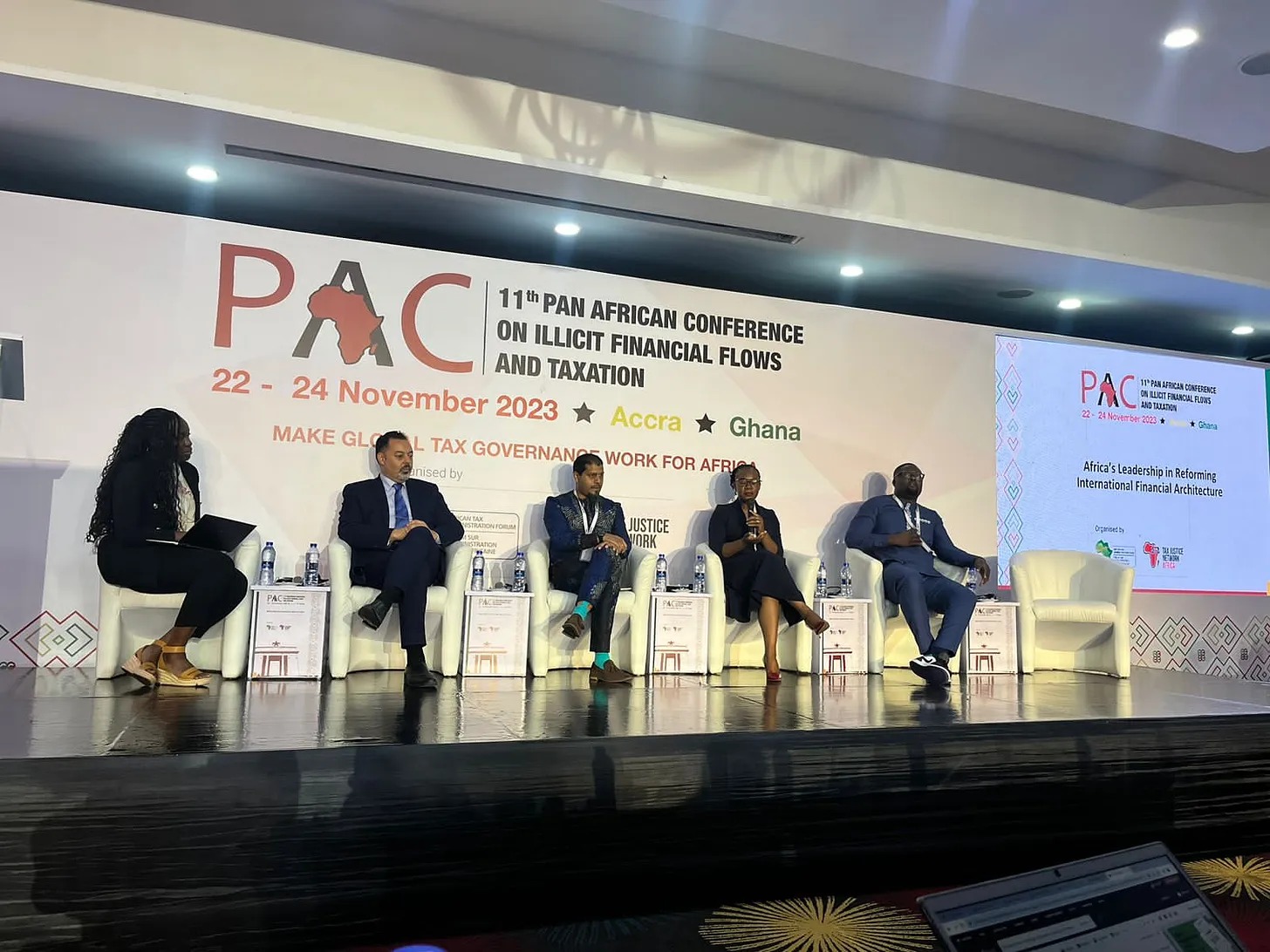Date

This blog was originally published by Fadhel Kaboub on 25th November 2023 on Substack
Photo courtesy: Fadhel Kaboub on Substack
Greetings from Accra, Ghana!
It’s been a hot, humid, and wonderful week in Accra. I gave a keynote speech at the 11th Pan-African Conference on Illicit Financial Flows and Taxation (Nov. 22-24). The title of my speech was “A Pan-African Vision for Structural Transformation: We can’t decarbonize a system that hasn’t been decolonized yet.” You can watch the video here, including the very insightful panel discussion with my dear colleagues Mukupa Nsenduluka (Tax Justice Network Africa), Titus Gwemende (Open Society Foundations), Jason Braganza (AFRODAD), Natalie Mwila (Center for Trade Policy and Development). and concluding remarks by Dr. Patrick Olomo Ndazana (African Union Commission). This was for a session titled “The International Financial Architecture and Africa’s Extractive Industry: Answering the Climate Change Question.”
Coincidently, the conference turned into a celebration of years worth of hard work by African tax justice leaders, scholars, and activists. On November 22, 2023, sitting in that conference hall in Accra, we watched the live vote at the United Nation in New York. Here is the full text of the resolution that effectively starts a process of establishing a democratic intergovernmental UN-based international cooperation on taxation. It was a historic moment for the Africa Group standing together with a broad Global South unity to begin the process of decolonizing the international tax system A system that was not established by us or for us, cannot be the system that will deliver justice or equity for us. The current international tax “cooperation” system is housed with the OECD, which is essentially a Global North dominated club that gives no voice to Africa and the rest of the Global South.
The lead up to this historic vote was marked by an aggressive campaign of obstruction, manipulation, and intimidation, including a last minute attempt by the United Kingdom to dilute the draft resolution with an amendement that would essentially neutralize Africa’s effort to decolonize the international tax system and to structurally address the illicit financial flows problem, these are financial flows that move from the Global South to the Global North (hence the hypocrisy of the OECD. This also explains why the tax havens voted agains the UN Tax Convention resolution).
It worth mentioning that Colombia was the only OECD country that not only voted for the resolution, but also played a key role in bringing key countries from across the Global South to unite behind the Africa Group in this historic effort. This victory is the first step in a long and difficult struggle to decolonize the global economic architecture, including the international finance, trade, investment, and tax architecture. Here is the African Union statement about the UN Tax Convention vote.
Predistribution, not Redistribution
In the tax justice movement and in progressive movements in general, we tend to have this well-meaning intuition to focus on re-distribution. We want to tax the rich to give to the poor; tax polluters to fund green investments; tax gambling to fund schools; tax smoking to fund hospitals; tax speculation to fund social programs, and the list go on. There is a fundamental problem with this logic.
This logic guarantees that if you succeed in taxing the “sins” out of existence then we’re killing the source of funding the good stuff. If smokers stop smoking (which is a good public health outcome), we end up killing the revenue stream for hospitals, but if more people smoke, then we have decent funding for public hospitals. We want to tax and regulate polluters out of existence. If we tax them for the purpose of funding, then we would want them to become bigger, more profitable, and therefore, more economically and politically influential, which ensures that they will use their power to block all efforts to decarbonize. We need to decouple the taxing from the spending. Tax polluters out of existence, not because we need their money or their permission the have clean air, water, soil and to have a sustainable and prosperous economy.
Furthermore, re-distribution means that accept the existing engines of the economy that produce inequality, injustice, exclusion, and pollution, then struggle to correct its effects and fight against powerful vested interest groups to tax a bit of their ill-gotten wealth to compensate the victims of this abusive system. What we need to do is to change the very engines that produce these negative effects in the first place, and replace them with new engines that produce equity, justice, inclusion, and prosperity for all by design. That is to say, we need a system that pre-distributes wealth the correct way, by design.
For more information about this article, Read more